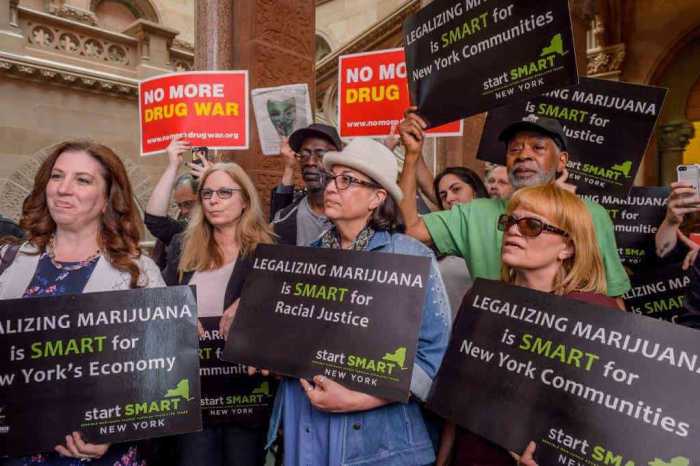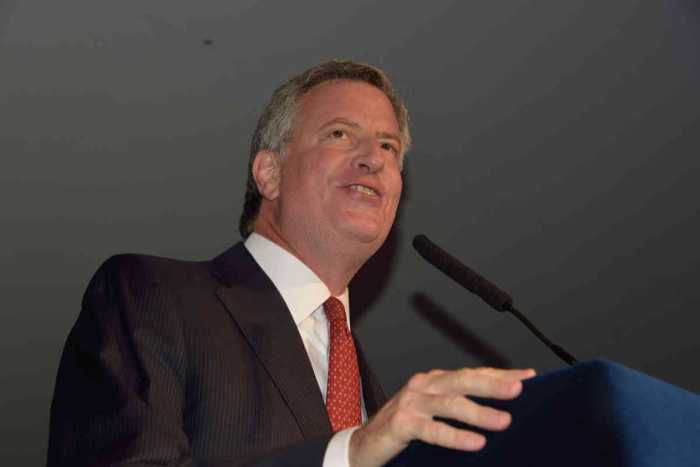State Senator Liz Krueger, an East Side Democrat. | NEW YORK STATE SENATE
Draft provisions of a “tax and regulate” marijuana bill is being circulated by State Senator Liz Krueger, an East Side Democrat.
Washington State and Colorado enacted such laws last year in referendums that make the recreational use of cannabis legal. The voters in these two western states accepted the argument that legalization makes sense after weighing the risks of marijuana use against the benefits of increased revenue.
Ethan Nadelmann, executive director of the Drug Policy Alliance that is helping to draft the new bill, explained that popular acceptance of marijuana has followed a path similar to that of marriage equality — with support steadily growing since the 1990s. A 2011 Gallup Poll showed 50 percent of Americans supporting legalization. The strongest supporters are 18 to 29-year-olds. Seniors over 65 are the least supportive. Democrats and liberals poll the highest in favor of a new direction.
East Side state senator leads forum co-sponsored by many fellow Manhattan Democratic lawmakers
The two recent referendums confirmed these polling results, especially Colorado, where legalized marijuana outpolled President Barack Obama, who won the state, by 60,000 votes. Nadelmann said that the Colorado referendum returns suggest that legalization could become a factor in next year’s gubernatorial election.
Krueger opened a May 15 forum on marijuana policy at Baruch College by saying, “I did smoke and inhale marijuana 30 years ago, and I have no plans to do it again.” She emphasized that she does not advocate pot use and would no more encourage young people to indulge than do countries like the Netherlands and Portugal that have decriminalized the drug.
The Krueger proposal would allow the legal use of marijuana by those over 18. Sales would be supervised by the State Liquor Authority, and retail outlets for marijuana would be subjects to the same sorts of restrictions that currently apply to bars and liquor stores — including prohibitions on proximity to schools and churches. A $50 tax would be levied on an ounce of marijuana, and local governments would have the option to add an additional five percent surcharge or to forbid its sale.
Nadelmann stressed that marijuana legalization is not an invitation to “turn on and tune out,” and he acknowledged that a revival of the days of “wake and bake” — when 10 percent of high school students were daily users of marijuana — could doom the effort at reform. Under the Krueger bill, youngsters would face civil sanctions for using and selling marijuana.
Dr. Julie Holland, the former head of emergency medicine at Bellevue Hospital and author of popular books on pot and ecstasy, said that cannabis is a natural ingredient in plants and humans and its use as a medicine would be approved if the US government looked at the question rationally and without political considerations. The National Institute for Drug Abuse, a government agency, only supports research that will show the harms of marijuana. Holland acknowledged, however, that marijuana is associated with risk for some adolescents during the several years after 18 when their brains have fully grown and the synapses should be forming more efficient connections. For those youth susceptible to manic depression or schizophrenia, pot use can aggravate their problems during this period.
Joanne Naughton, a retired New York City police lieutenant and a member of Law Enforcement Against Prohibition, or LEAP, strongly backed the Krueger legislation. Prohibition, she said, is “a failed policy.” At the same time, she reminded those attending the Baruch forum that police departments are quasi-military organizations in which policies are set at the top and carried out down a chain of command. The mayor and police commissioner are the ones responsible for the staggering rates of stop and frisk arrests for minor marijuana possession, not the officers on the streets.
A draft memorandum from Krueger noted that the NYPD made 50,300 marijuana-related arrests in 2010— which constituted 14 percent of all arrests that year. Those arrested were almost all people of color who received a criminal record for a first-time non-violent crime. This policing cost the city $75 million. Colorado estimates it would earn up to $22 million in taxes from its new law, and New York has a population nearly four times its size.
Alfred Carrasquillo, a community organizer for drug reform, spent time in jail for marijuana possession and failing drug tests for weed. He told the Baruch audience about his life in the “system” from 14 to 18. He attributed his fate to one factor: “racism.”
The forum Krueger convened was co-sponsored by State Senator Brad Hoylman, Assemblymen Richard Gottfried, Brian Kavanagh, Micah Kellner, and Dan Quart, and City Councilmembers Dan Garodnick and Jessica Lapin. Krueger was the only elected official who attended, and there is not yet a formal draft of her legislation.



































